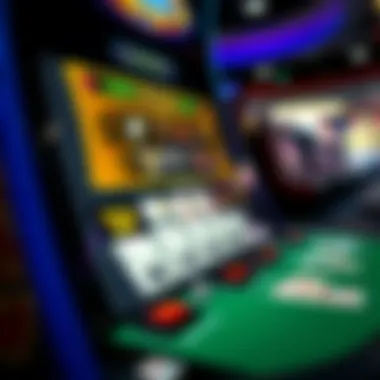Exploring the Complex World of Blackjack Video Games


Intro
As the digital landscape continues to expand, one of the key players in the online gambling realm is blackjack video games. The simple allure of flipping cards and the heartbeat of strategy come together to redefine how players engage with this classic casino game. Unlike traditional blackjack, where the feel of the cards and the presence of a dealer create a unique atmosphere, video games offer a reimagined experience filled with flashing lights and innovative mechanics.
In this article, we will explore the core aspects of blackjack video games. This journey will take us through the essential game strategies, critical gambling insights, and the psychological elements that enhance player experience. Such exploration is not merely an intellectual pursuit; it holds real implications for both novice gamblers testing the waters and seasoned players looking to refine their skills.
By examining popular blackjack titles, their strategies, and their impact, we'll provide valuable insights that can change the way you view this timeless game. Let's dig into the nitty-gritty and discover what makes blackjack video games a standout within the broader online gambling culture.
Preamble to Blackjack Video Games
Blackjack has come a long way from the smoky backrooms of Las Vegas to the glimmering screens of our digital devices. Its transition into the realm of video games is not just a trend; it's a reflection of changing player expectations and technological advancements. As the landscape of gaming continues to evolve, the significance of understanding blackjack in its digital form becomes ever more critical. This article aims to unravel the layers of blackjack video games, examining their historical context, game mechanics, and psychological influences that drive players.
Understanding the Essence of Blackjack
Before diving deep into the digital playground, it's essential to grasp what makes blackjack a beloved card game. At its core, blackjack is a game of skill and strategy, pitting players against the dealer, rather than each other. The objective is simple: score 21 or as close as possible without busting. This blend of luck and strategy fosters an environment where players often develop personal styles, allowing for diverse experiences.
Understanding the essence of blackjack also means recognizing its social and cultural aspects. Players often gather around tables, engaging in lively banter. In video games, while this social interaction may shift, the competitive spirit remains intact, drawing gamblers and gaming enthusiasts alike into a virtual arena where strategy reigns supreme.
The Transition from Traditional to Digital
The shift from traditional blackjack to its digital counterpart is a fascinating journey marked by technological innovation and changing consumer preferences. Traditional games offered a tactile experience, with the feel of cards and dice, and the atmosphere of a casino echoing laughter and the clinking of chips. However, the advent of online gaming has brought a new dimension.
In blackjack video games, players harness the power of technology, enjoying the thrill of the casino from the comfort of their homes. An important factor in this transition is accessibility. No longer do players need to dress up, travel to a physical casino, or adhere to stringent operating hours. Instead, they can connect to their favorite games anytime, anywhere, thus expanding the player base significantly.
Moreover, the evolution has introduced a wealth of features, such as live dealer options and innovative gameplay mechanics, blending traditional elements with modern technology. Players can now engage with state-of-the-art graphics and sound, making the experience more immersive. Whether it’s a solo session or competing against friends, the digital arena offers various options that traditional tables cannot match.
Blackjack video games bridge the gap between the nostalgic feel of the casino and the convenience of the modern world, driving continued interest and engagement in this classic card game.
Historical Context of Blackjack in Gaming
Understanding the historical context of blackjack within the gaming industry is crucial for anyone looking to grasp its evolution and relevance. It serves as a foundation, illuminating how this long-standing card game transitioned from smoky taverns to sleek, brightly colored video game consoles. The evolution is not merely about technology but also reflects cultural shifts and changing player expectations over decades.
Origins of Blackjack
Blackjack's history traces back several centuries, with roots grounded in various card games across Europe. The earliest known variant, Twenty-One, appeared in the early 1700s in French casinos. From there, it may have crossed the English Channel, becoming popular in England under the name Vingt-et-Un. The goal, initially simple, was to beat the dealer by obtaining a hand value as close to 21 as possible without exceeding it.
From these quaint beginnings, the game made its way to the New World, where it took on a new life, gaining a permanent foothold in American gambling culture during the early 19th century. It started to gain official rules, which made it more structured and appealing, eventually leading to its adoption in casinos across the United States. These adaptations are significant—each geographical area added its flavor to the game, thus altering strategies and gameplay elements.
Key milestones include:
- The introduction of bets based on the outcome of blackjack hands.
- The establishment of various house rules that varied from one casino to another.
- The formalization of strategies that players began to document, laying the groundwork for future mathematical approaches to the game.
Each of these developments paved the way for what we now understand as modern blackjack, a blend of skill and chance that has captivated millions.
Rise of Computer Gaming
The leap from traditional blackjack to its digital counterpart is a prime example of how technology can enhance and transform entertainment. The 1970s and 1980s marked the dawn of personal computing, a time when developers began experimenting with video game formats. Early adaptations of blackjack, often simplistic by today's standards, introduced players to the concept of digital betting. These early games laid the groundwork for future advancements, broadening access to players who may not have had the chance to step foot in a casino.
As computers became more powerful and user-friendly, so too did blackjack video games. The advent of online gambling platforms in the late 1990s transformed the landscape forever. Suddenly, players could log in from the comfort of their homes, playing at any time, day or night. This accessibility changed not only player demographics but also the strategies employed in gameplay since the environment was devoid of the social pressures often felt in physical casinos.
Moreover, the rise of online blackjack spurred innovations in game mechanics and user interfaces that enhanced the gaming experience. For instance, the introduction of animated graphics and interactive features made gameplay more engaging, drawing players who might have previously preferred static, traditional varieties.
"The transition to digital blackjack corresponded with increased research into user engagement and psychological factors, emphasizing how player behavior and experience fundamentally shape the game."
Today, the world of blackjack video games continues to expand with advancements in technology, setting the stage for even greater developments in the future.
Game Mechanics of Blackjack Video Games
Understanding the game mechanics of blackjack video games is crucial for players aiming to sharpen their skills and enjoy a seamless gaming experience. These mechanics encompass rules, user interface design, and the underlying technology that drives randomness in the game. Each element contributes to the overall immersion and strategy involved in this beloved card game. Moreover, insightful exploration of these mechanics can elevate a player's understanding of how advantages are gained and the nuances that distinguish different gaming platforms.
Rules and Objectives
The rules of blackjack are relatively straightforward, allowing both newcomers and seasoned players to dive right into the action. In essence, the objective is to accumulate a hand value as close to 21 as possible, without exceeding it. Players begin with two cards, and they can choose to receive additional cards in an attempt to improve their hand.
Key aspects of these rules include:
- Card Values: Cards 2 through 10 retain their face value, while face cards (Jack, Queen, King) are worth 10. An Ace can count as either 1 or 11, depending on what benefits the player most.
- Dealer's Role: While players seek to win against the dealer, it's essential to note that the dealer also follows specific rules, usually hitting on 16 or less and staying on 17 or more.
- Winning Conditions: A player wins if their hand value exceeds the dealer's without going over 21, or if the dealer busts (exceeds 21). Additionally, a natural blackjack, which occurs with an Ace and a 10-valued card, yields the highest payout.
In a video game setting, the implementation of these rules remains crucial. Developers often ensure that they are faithfully represented in order to replicate the traditional experience, engaging users in a familiar yet innovative format.
User Interface Design
The user interface (UI) of blackjack video games plays a pivotal role in player engagement. Good UI design enhances the overall experience by providing an intuitive and visually appealing layout. When players can maneuver swiftly through the game, it contributes not only to enjoyment but also to effective gameplay.
Elements of effective UI include:
- Visual Clarity: Clear visibility of cards, chips, and other relevant data is integral. Players should easily distinguish between their hand and the dealer’s, as well as manage their bets without confusion.
- Nail Control Features: Touchscreen capabilities allow for seamless interaction. Tapping to hit, stand, or double down should feel natural and responsive. The design must also accommodate both mouse and keyboard controls for desktop gamers.
- Feedback Mechanics: Providing immediate feedback on player actions—like animations and sound effects—enhances the feeling of involvement. An engaging UI also includes tutorials or prompts for newcomers, guiding them through gameplay mechanics effectively.


Random Number Generators
At the core of every blackjack video game lies the Random Number Generator (RNG) technology. The RNG ensures fairness by producing unpredictable outcomes, simulating the randomness of physical card shuffling. A solid understanding of how RNG functions is vital for players seeking to demystify their chances of winning.
Key considerations regarding RNG include:
- Fair Play Assurance: Reputable gaming developers often subject their RNG algorithms to rigorous audits. This process ensures the software operates without bias, granting players confidence in the integrity of the game.
- Impact on Strategies: While players may apply various strategies such as card counting, the use of RNG means that no patterns can be reliably established over time. This feature keeps players engaged but aware that skill alone cannot guarantee success.
- Legal Compliance: Most jurisdictions require online gaming platforms to use certified RNGs, complying with strict regulations to protect players from potential manipulation. Hence, players should refer to licensing bodies for validation when selecting a platform.
"The sophisticated intersection of user interface design, rules comprehension, and random number generation forms the bedrock of creating a thrilling blackjack experience in video games."
In summation, the mechanics of blackjack video games are not merely a backdrop; they actively shape the player's experience. Knowing the rules and adapting strategies based on the game's mechanics, users can navigate the digital blackjack landscape more effectively, enhancing both enjoyment and potential rewards. For those interested in further information about gaming principles, resources like Britannica and Wikipedia provide detailed studies.
Comparative Analysis: Traditional vs. Video Game Blackjack
When you look at blackjack across different formats, the dissimilarities can be striking. Traditional blackjack, played usually in a bustling casino environment, contrasts sharply with the digital version that thrives on screens. Understanding these contrasts is vital for both seasoned gamblers and newcomers. This section lays out the nuances between these two blackjack realms, aiming to illuminate the benefits and considerations that accompany each format.
Playing Styles and Strategies
The playing styles in traditional and video game blackjack can vary significantly, and this distinction impacts strategy. For players in a real casino, there's a palpable social aspect. You might overhear discussions at the tables or witness expressions of joy and despair as cards are dealt. This social gambling contributes to a unique dynamic. Players often adjust their strategies based not just on mathematics, but also on the behaviors of others.
On the flip side, video game blackjack often isolates players, allowing for a more solitary experience. This isolation can lead to advantages; players can take their time to think through each move without the pressure of opponents or spectators. Players also tend to delve deeper into mathematical strategies when there’s no one watching. Here, strategies can include the use of card counting, which requires a careful tracking approach, though it’s worth noting that many online games employ software that wipes out this advantage.
It’s essential to recognize that while creativity in strategy flourishes in the social environment of a casino, video game blackjack allows for experimentation without the fear of judgment. Players can develop and refine strategies based solely on outcomes rather than peer pressure.
House Edge and Payout Ratios
The house edge in blackjack is one of the elements that players must comprehensively consider. In traditional settings, this edge often hovers around 1%, though specific variables can push it higher. Factors such as rules about doubling down, splitting pairs, and the number of decks in play alter this edge. Understanding these nuances can be a game-changer; savvy players often seek out tables that offer favorable rules to minimize the house’s advantage.
Video game variants, however, can have a different appeal. They often promise higher payout ratios and lower house edges, accommodating players who might feel intimidated at a live table. For example, if a digital variant offers a specific payout for a natural blackjack, it may also allow players to access bonuses that aren’t typically available in live crooks.
Nevertheless, it's crucial for players to research each specific game. Just as with traditional blackjack, rules can differ from one video game to another, affecting overall playability and risk. Factors such as bonus features, wild cards, or different bet structures can skew the house edge either way. Each player should therefore read the fine print carefully before placing bets, ensuring they fully understand what they’re stepping into.
Key Takeaway: While traditional and video game blackjack both provide strategic depth, the environment in which they’re played significantly influences the strategies employed and the rules that govern them.
In summary, the distinction between traditional and video game blackjack goes beyond mere mechanics. It encompasses psychological factors, social interactions, and strategy adaptations, as well as the mathematical intricacies of house edges and payouts. These elements collectively dictate the player experience, shaping how different individuals approach the game.
Popular Blackjack Video Games
Blackjack video games have carved out a significant niche within the online gambling landscape. Their popularity is not just a fad; it reflects the fusion of classic gambling strategy with the cutting-edge technology of gaming. As players seek out both entertainment and a challenge, blackjack video games provide a unique environment where traditional tactics meet innovative mechanics, making it crucial to explore the most prominent titles in detail.
Such games serve as a bridge for players—be they neophytes or veterans—enhancing their understanding of the game through interactive experiences. Beyond just the gambling experience, these games bring players directly into environments that mimic real-life card tables, often in stunningly visual and audio-rich settings. The draw of competing against AI dealers, a familiar aspect to many, allows for practice without the financial pressures of real-world gaming.
Top Titles Reviewed
To grasp the significance of blackjack video games, one must examine the standout titles that have garnered attention over the years. Here are some notable mentions:
- Casino World Blackjack: This title is known for its welcoming interface that attracts new players. It features tutorials and challenges that adapt to one's skill level.
- Blackjack 21: A mobile sensation, this game combines traditional rules with stylish graphics, captivating a younger audience eager for vibrant gaming experiences.
- Blackjack Neo: This game stands out by integrating innovative betting features and has seen popularity among strategists looking for a competitive edge.
Each game mentioned brings its unique flavor and approach to the classic game of blackjack. They are not just games but rather ecosystems where players can explore strategies, hone their skills, and understand the mechanics that drive the game.
Innovative Gameplay Features
The ingenuity of blackjack video games often lies in the innovative features they showcase. These advancements significantly enhance the gaming experience, catering to both casual players and seasoned pros. A few notable traits include:
- Single Player vs. Multiplayer Modes: Players can choose to play alone or opt for a multiplayer setting where the competition heats up against friends or strangers.
- Customizable Rules: Many games allow users to alter rules, like dealer stands on soft 17 or different payout ratios for blackjack itself, facilitating personalized gameplay.
- Thematic Variations: From underwater realms to high-tech hubs, some games offer themes that seamlessly integrate with gameplay, creating an immersive experience.
- Real-Time Analytics: These features provide players insights into their gaming style, helping them adapt strategies quickly, which are crucial for maintaining an edge over the house.
"The combination of adaptability and innovation in blackjack video games reflects the continual evolution of gameplay, shaping how we engage with this classic casino favorite."
Through these innovative mechanics, blackjack video games continue to thrive, paving the way for future developments in gaming technology. Each feature implemented provides players with tools to enhance their skills, making the learning curve not only manageable but enjoyable.
Psychological Factors in Blackjack Video Games
When delving into blackjack video games, it becomes evident that psychology plays a crucial role in shaping player experience and strategies. The decisions made at the virtual table are as much about mental acuity and emotional regulation as they are about understanding the game mechanics. As players engage with these digital versions, they come across several elements that greatly influence their interaction with the game.
Emotional Engagement
Players often exhibit emotional responses that can greatly impact gameplay. For instance, a player on a winning streak might feel a rush of excitement that could lead to riskier bets, while a losing player may feel frustrated or anxious, potentially affecting their decision-making process. This emotional rollercoaster can create a cycle of behavior that heightens risk and reward scenarios.
Cognitive Biases
One of the fascinating psychological elements in blackjack video games is the prevalence of cognitive biases. Gamblers often fall prey to biases such as the gambler's fallacy, where they believe that past events influence future outcomes. For example, a player might feel compelled to keep playing after a string of losses, believing that a win is due. Understanding these biases can help players navigate their decision-making more wisely.
"In blackjack, as in life, the choices we make are often influenced by our emotions and perceptions, not simply by logical calculations."
Social Interaction Aspects
Although blackjack is typically viewed as an individual game, the social aspect can influence decisions tremendously, especially in multiplayer environments or when interacting through chat functions in online platforms. Players may adjust their strategies based on the perceived tendencies of opponents, which can make the experience more dynamic. This interaction can amplify both competition and camaraderie, further complicating the psychological landscape of the game.
Attention and Focus
Blackjack video games demand a level of attention and concentration that can affect a player's performance. Distractions from outside factors can impair the ability to execute strategies effectively. Moreover, the fast pace of these games may lead to hasty decisions, resulting in losses or missed opportunities. Cultivating mindfulness and attentiveness can become critical components of success in this environment.
The Role of Decision Making
The essence of blackjack revolves around decision-making, which becomes even more nuanced in the context of video games. Recognizing how choices are made enhances the understanding of what drives player success or failure. Players continually weigh probabilities, evaluate risks, and assess potential outcomes with each hand dealt.


Players might encounter various strategies, each tied to different philosophies regarding risk and reward. For example, the decision to double down presents both a challenge and an opportunity—players must gauge their confidence in their hand against the dealer's upcard. Here, calculation meets instinct, showcasing a fascinating blend of analytical thought and emotional response.
Additionally, decision-making becomes intertwined with other aspects such as bet sizing and when to walk away. The pressure of immediate feedback in video games can prompt rapid decisions, making it essential for players to develop strong judgment skills and emotional discipline.
Risk and Reward Perception
In blackjack video games, understanding one’s perception of risk and reward is vital. Players are constantly evaluating odds, weighing their current hand against the dealer’s, and considering the potential payout. This ongoing calculation often leads to a unique blend of satisfaction and anxiety, giving rise to what we might call the "thrill of the chase."
Key factors influencing risk and reward perception include:
- Game Design: The layout and feedback mechanisms within the game affect how players anticipate and react to risk.
- Personal Experience: A player’s background and prior experiences can shape their willingness to take risks.
- Immediate Gratification: Some video games offer quicker rewards compared to traditional gameplay, altering the risk/reward balance.
Players also often Fall victim to illusions of control; they may develop a false sense of mastery over the game's randomness. This discrepancy can lead players to take on greater risks under the belief that their decisions heavily influence outcomes, which is seldom the case in games driven by luck.
In summary, psychological factors, particularly decision-making and perception of risk and reward, create a complex web that underlies the blackjack video gaming experience. For those seeking to understand and master the game, recognizing these elements can offer insightful perspectives into gameplay strategies and emotional management.
Technical Aspects of Game Development
The realm of blackjack video games hinges on a well-crafted foundation of technical development. This isn't mere tinkering with code; it's about creating an immersive experience that captures the essence of the traditional game while leveraging the advantages of modern technology. A thorough understanding of the technical aspects of game development is crucial, as it influences everything from user experience to gameplay mechanics and regulatory compliance.
Coding and Programming Challenges
When it comes to coding blackjack video games, developers face a multitude of challenges that require not only technical prowess but also creativity. The game must ensure a slick interface while dynamically responding to player choices. This brings up several hurdles:
- Game Logic: Developers must define all the rules of blackjack clearly in the code. This involves not just basic features like hitting, standing, or doubling down but also more complex options involving splits and insurance. The logic must be flawless to avoid any discrepancies during gameplay.
- Error Handling: One slip of the code can lead to chaotic outcomes. If, for example, a player tries to hit on a bust hand or a glitch occurs in card shuffling, it can cause a user’s frustration. Implementing robust error handling procedures is essential to catch and rectify these issues before the player even sees them.
- Multiplayer Functionality: In some video game formats, multiple players can play against each other or against the dealer. The coding must manage the state of each game session, ensuring that every player’s actions are correctly recorded and reflected in real-time without lag. Poor implementation can lead to synchronization issues that ruin the experience.
Integration of Artificial Intelligence
Artificial intelligence plays a pivotal role in enhancing the gameplay experience in blackjack video games. One critical application is the use of AI algorithms to simulate dealer behavior. Designed to mimic how a human dealer would react, these algorithms must follow established rules while providing unpredictability to keep the game lively.
- Adaptive Difficulty: Integrating AI allows the game to adjust its difficulty based on player performance. If a player is consistently winning, the AI could alter its strategies to offer a greater challenge, which prolongs engagement.
- Player Data Analysis: AI can be employed to analyze player behavior, gauging patterns and preferences. By doing so, developers can personalize gaming experiences, offering tailored approaches that resonate with individual players. This can include recommending specific strategies or informing players about beneficial betting patterns.
- Theoretical Simulation: AI also aids in simulating theoretical gameplay scenarios, assisting developers in refining rules and algorithms that impact house edge and payout ratios. By using simulations, developers can predict outcomes and make necessary adjustments based on gameplay dynamics.
Strategies for Success in Video Game Blackjack
When pursuing excellence in blackjack video games, understanding the strategies that enhance your odds is vital. Players are not just trying their luck; they are employing calculated techniques to maximize their winnings. The digital format introduces unique dynamics that shape play styles, enabling sophisticated strategies that may not be as accessible in traditional settings. From tailored betting methods to innovative adaptations of classic techniques, the focus here is on ensuring success in the virtual casino world.
Betting Systems Analysis
Betting systems are strategies gamblers use to determine how much to wager in each round. Unlike throwing darts at a board, these systems rely on statistical principles and patterns found in gameplay. Many players lean towards progressive betting systems such as the Martingale, where you double your bet after a loss, or the Fibonacci sequence, which uses the famous series of numbers to set bet sizes.
In video game blackjack, the flash of the screen and the speed of play can suit these systems well. However, it’s essential to bear in mind that no betting system can overcome the house edge entirely, which remains a constant in any gambling endeavor.
Moreover, tracking wins and losses becomes more straightforward with digital interfaces. A player can observe trends over several sessions, informing their subsequent bets.
- Advantages of Betting Systems:
- Considerations:
- Provide a structured approach to betting.
- Can lessen the emotional toll from losses.
- Helps manage bankroll effectively.
- Understand that systems don't change the house edge.
- A flexible mindset is crucial to adapt based on gameplay.
Ultimately, integrating a betting strategy requires a balance of risk management and an understanding of the game’s mathematical probabilities.
Card Counting Techniques Adapted for Video Games
While traditional card counting may seem like an obsolete strategy in a digital world dominated by Random Number Generators (RNGs), clever adaptations do exist for video game blackjack players. The idea behind card counting is straightforward: keep track of cards that have been dealt to predict future cards. This technique essentially shifts the odds in favor of the players when executed correctly.
Video games may complicate this, given that most use continuous shuffling algorithms. However, players have devised ways to adapt traditional strategies for success:
- Focus on the Bet Size: Adjust your bets based on your perceived advantage. When you think the deck is rich in tens and aces, increase your stakes.
- Mental Tracking: Even in a digital age, keeping track of the cards that come up—specifically high-value versus low-value—still applies. Use memory techniques to derive potential outcomes, even if it isn’t a precise count.
- Look for Patterns: Some video game blackjack titles may follow specific shuffling patterns. While it's a far cry from true card counting, recognizing trends can steer your betting decisions.
- Utilize Game Features: Many games offer statistics about your recent rounds. Pay close attention to these, as they can inform your next move.
Adapting these traditional methods to the digital landscape illustrates how innovation and strategy continue to interact. Card counting remains an intellectual challenge, reinforcing the necessity for players to be engaged and invested in the process.
Overall, success in blackjack video games hinges on a combination of effective betting strategies and the inventive adaptation of established techniques. Embracing this unique blend paves the way for a more rewarding gambling experience.
Regulatory Environment Surrounding Online Blackjack
Navigating the world of online blackjack means understanding the regulatory landscape that shapes and guides its proliferation. The importance of this regulatory environment cannot be understated; it ensures players engage in safe and fair gameplay. Understanding the rules and limitations set by governing bodies not only protects the player but also upholds the integrity of the game itself. Moreover, regulations affect how operators develop their platforms, influencing everything from game design to marketing strategies.
The benefits of a robust regulatory framework are manifold. Firstly, these regulations help to legitimize operators, creating a healthier marketplace where players can trust that they are joining a reputable site. Secondly, they contribute to player protection, guarding against fraud and ensuring that winnings are legitimately earned and can be withdrawn without hassle. Lastly, regulation assists in responsible gambling initiatives, aiming to reduce the risks associated with unchecked betting behavior.
Licensing Requirements
Licensing is a pivotal part of the regulatory framework surrounding online blackjack. Operators must obtain licenses from recognized gaming authorities. These licenses serve as a seal of approval, indicating that the operator meets established legal and operational standards. The requirements for obtaining these licenses vary widely from one jurisdiction to another. For example, the UK Gambling Commission, known for its strict standards, mandates that operators must undergo thorough assessments before being granted a license.
It's crucial for players to check the licensing status of any online casino before they start playing. A site that's properly licensed can assure players of compliance with local regulations, safeguarding their interests. Furthermore, different jurisdictions impose ongoing compliance obligations, ensuring operators continue to uphold standards after obtaining their licenses. This kind of oversight acts as a safety net for players, reducing the possibility of unfair practices.
Fair Play Standards


Fair play standards in online blackjack are another important aspect regulated by governing bodies, establishing the principle of fair and random gameplay. These standards mean that games must operate using Random Number Generators (RNGs) to ensure outcomes are not manipulated. Players should look for certifications from independent testing agencies, which confirm that the games meet the required fairness criteria.
The implementation of fair play standards not only protects the consumer but also builds public confidence in online casinos. When a gambling authority enforces stringent standards, it helps to cultivate an environment where players can enjoy the game without worrying about potential injustices.
“The integrity of online gambling relies not just on compliant operators but also on a framework that encourages transparency and accountability.”
Furthermore, many governments set forth ground rules to balance the interests of operators with consumer protection. For instance, specific promotional practices, such as terms and conditions on bonuses, fall under scrutiny to ensure they are fair and clearly communicated. Adhering to these regulations is vital; failure to comply can lead to fines or even revocation of a gaming license.
In sum, the regulatory environment surrounding online blackjack is an intricate mesh of licensing and fair play standards designed to keep both players and operators in check. By understanding these aspects, participants can feel more secure as they engage with blackjack video games, knowing there are stringent measures in place offering a fairer chance of winning.
Future Trends in Blackjack Video Gaming
The landscape of blackjack video gaming is evolving much like the waves lapping against the shore; constant and dynamic. As technology makes leaps and bounds every day, the implications for blackjack enthusiasts and developers are both profound and multifaceted. Exciting shifts toward innovative technology and social interaction are reshaping how we engage with this classic game.
Emergence of Virtual Reality
In recent years, the dawn of virtual reality (VR) has turned the gaming industry on its head. Imagine sitting at a lavish poker table surrounded by other players, all from the comfort of your living room. With VR technology, blackjack is no longer constrained to 2D screens. Instead, players dive into immersive environments that replicate the ambiance of a high-stakes casino. This brings a heightened sense of presence and engagement that traditional methods simply can’t match.
- Social Interaction: Players can interact with others through their avatars, fostering a sense of community. This could lead to more player-to-player communication and camaraderie.
- Enhanced Realism: The graphics and sound design in VR can recreate the sights and sounds of a casino, making it feel as if one is truly in the thick of it.
- Skill Development: Playing in a realistic environment may enhance decision-making skills, preparing players for real-life scenarios.
However, there are also considerations. Not everyone has access to high-end VR equipment, limiting the audience. The adjustment to navigating in a virtual space could also be disorienting for some, especially for those who aren’t tech-savvy. The challenge lies in making these platforms accessible and intuitive for the broader gaming community.
Advancements in Game Design
As technology advances, so too does the art and science of game design. In the realm of blackjack video games, developers are increasingly leveraging trends to create unique and enriched gameplay experiences. There are several emerging design concepts to keep an eye on:
- Adaptive Gameplay: Future games may employ algorithms that adjust difficulty in real-time, offering tailored experiences based on player skill levels.
- Gamification Elements: Implementing achievement systems, leaderboards, and rewards can motivate players, enhancing engagement and weekly challenges that renew interest.
- Cross-Platform Play: The possibility for players to engage across different systems and devices is paramount. This not only broadens accessibility but fosters a larger community, uniting players regardless of the platform they prefer.
The focus on aesthetics also bears consideration. Players are drawn not only to gameplay but to how visually appealing the game is. Effective use of colors, animations, and themes related to blackjack can keep players hooked and encourage longer gaming sessions. Modern games might even blend genres, mixing traditional blackjack mechanics with elements from fantasy or adventure gaming.
In summary, the future of blackjack video gaming holds untold promise. As virtual reality becomes more integrated into the player experience, and advancements in game design push conventional boundaries, the way we engage with blackjack is poised for a delightful transformation.
Harnessing these trends can open new avenues for both developers and players, ultimately enriching the world of blackjack, making it more accessible and visually captivating than ever before.
Cultural Impact of Blackjack Video Games
The significance of blackjack video games transcends the simple act of playing a game. It's about how these digital renditions of a classic card game resonate within modern culture and societal norms. The rise of blackjack video games has sparked notable shifts in gambling behavior, cultivated new communities, and played a role in portraying gambling in various media formats.
Influence on Gambling Behavior
Blackjack video games have fundamentally altered how individuals approach gambling. Unlike traditional casino settings, these games allow users to engage in a risk-free manner from the comfort of their own homes. This shift has led to a surge in participation among different demographics, particularly younger players who might avoid conventional casinos due to social stigma or inaccessibility.
The immersive nature of these video games encourages a more strategic mindset among players. Unlike simply playing for fun, many individuals adopt a serious approach, honing their skills for potential monetary gain. The accessibility of digital platforms has made gambling seem less intimidating, often encouraging individuals to see blackjack as a game of skill rather than merely chance.
Moreover, notable trends have emerged, including the increase of online communities and forums. Players share strategies, discuss outcomes, and build networks around shared interests, fostering a sense of belonging. These interactions can reshape gambling perceptions, from being deemed a solitary pursuit to a connected and interactive experience.
Representation in Media
Blackjack video games have also left their mark on popular culture, weaving into films, television shows, and social media. They are often portrayed in gritty casino dramas where high-stakes games showcase the allure and adrenaline of gambling. Movies like 'Rounders' or '21' illustrate the thrill of blackjack, often romanticizing the risk and quick thinking required in games.
In contemporary media, platforms like Twitch and YouTube have emerged as spaces where players showcase their skills while commenting on gameplay in real-time. This form of representation has attracted both seasoned gamblers and newcomers, providing a platform where strategies are dissected and learned in a communal atmosphere. Additionally, social media platforms like Reddit have dedicated threads where players can discuss their experiences and delve into the psychology behind their game choices, making blackjack artistry accessible to the masses.
Overall, these representations play a dual role. They reinforce blackjack's reputation as both an entertaining pastime and a serious activity, showing that there’s more to it than mere luck. Essentially, the cultural impact of blackjack video games embodies a significant evolution in the perception and practice of gambling, shaping how it is enjoyed and understood today.
"The rise of blackjack video games highlights the fine line between entertainment and gambling, bringing together diverse communities in ways previously unimaginable."
The evolution of blackjack in the digital sphere illustrates critical cultural dynamics at play. It evolves how we see not just the game itself, but the broader narrative around gambling in society.
Closure
The exploration of blackjack video games reveals a multifaceted landscape where technology and traditional gambling converge. The importance of this topic extends far beyond mere entertainment; it encompasses critical elements like player engagement, strategic gameplay, and the evolving landscape of online gambling.
The findings highlight several key insights that are valuable for both new and experienced players. Firstly, understanding the mechanics of blackjack video games allows players to refine their strategies and improve their chances of winning. The integration of technology and programming challenges not only enhances the gaming experience but also introduces innovative features that impact gameplay.
Additionally, the psychological factors that govern decision-making are crucial for success in blackjack video games. Players must navigate emotional responses and risk perceptions, which can vary widely from one individual to another. Recognizing these patterns can provide a competitive edge.
"The fusion of traditional gameplay with digital innovation shapes the future of blackjack, influencing both strategies and market dynamics."
Summarizing Key Insights
In summation, the study of blackjack video games underscores several pivotal themes:
- Evolution of Gameplay: Transitioning from traditional to digital formats has introduced a wealth of strategies and innovations.
- Psychological Dynamics: Copying the human aspects of decision-making sheds light on how players respond to risk and reward.
- Technological Advances: Programming, artificial intelligence, and user experience design bring exciting transformations to the blackjack environment.
By recognizing these nuances, players can better navigate their gaming experiences, turning knowledge into practice.
Final Thoughts on Future Developments
Looking ahead, the future of blackjack video games seems ripe with promise. Emerging technologies, particularly virtual reality, are poised to alter the player experience dramatically. As these advancements unfold, they promise to immerse players in ways previously thought unattainable.
Moreover, continuous innovations in game design and AI integration will likely foster environments that not only retain traditional elements but also encourage new forms of interaction. As these developments shape player expectations, adaptability and strategic thinking will become even more essential.
For enthusiastic gamers, staying abreast of these changes means honing both skills and understanding, ensuring they remain competitive in an ever-shifting landscape. Overall, continued exploration into the dynamics of blackjack video games will yield rich insights, informing both players and developers of the exciting challenges and opportunities that lie ahead.



